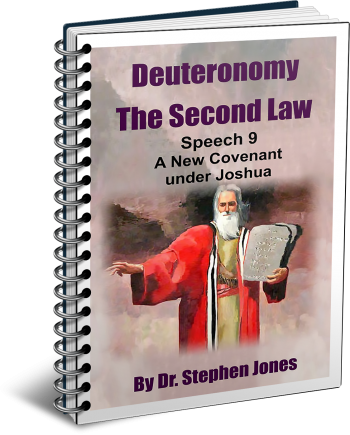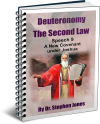Latest Posts
View the latest posts in an easy-to-read list format, with filtering options.

A commentary on the ninth speech of Moses in Deuteronomy 29-31. The book of Deuteronomy is a series of 12 speeches that Moses gave just before his death at the end of Israel's wilderness journey.
Category - Bible Commentaries

Deut. 31:24-26 says,
24 And it came about, when Moses finished writing the words of this law in a book until they were complete, 25 that Moses commanded the Levites who carry the ark of the covenant of the Lord, saying, “26 Take this book of the law and place [suwm] it beside [tsad] the ark of the covenant of the Lord your God, that it may remain there as a witness against you.”
Once the giving of the law was finished in Deut. 31:13, and Joshua had been commissioned in Deut. 31:23, Moses instructed that the book should be placed in the Ark of the Covenant.
Moses’ speeches were finished. Perhaps it took a while longer for Eleazar to pull together his notes summarizing the main points of Moses’ speeches, so that they could be formatted into an actual book. The brevity of each topic of law in Deuteronomy appears to show that these were the notes summarized by Eleazar, rather than a literal, word-for-word record of everything that Moses said. This, of course, had no negative effect upon its inspiration.
The written version of the law was thus completed shortly after Joshua’s commission. Since Moses himself is given credit for writing it, it appears that he personally proofed it and made any additions or corrections that might have been necessary. Certainly, the book was not completed without Moses’ full approval.
The book was “placed,” as Moses instructed, “beside the ark of the covenant.” Was the book put inside the ark, as Heb. 9:4 says? The wording in Deut. 31:26 says that it was placed “beside” (tsad) the ark. However, the key is not found in the Hebrew word tsad, but rather in the previous word, suwm, “placed.” Gesenius tells us that suwm means, “to put, place, set, appoint, make, ordain, establish.”
In other words, suwm can refer to the act of physically placing something—in this case, “beside” the Ark. But it can also mean to appoint, ordain, or establish something along with something else. In this case, the law was “placed” or given status equal to the Covenant.
It appears to me that Deut. 31:26 was referring to the fact that this law was appointed and ordained along with the Covenant (i.e., the Ark). Both were ordained as equally inspired of God. It shows that the law and the Covenant (the Ark) are two distinct things, yet are linked together. Hence, Moses ordained not only the Covenant but also the law, ordaining them side by side. They received equal standing in the sight of God.
Over and beyond this, Moses also put the law inside the Ark of the Covenant, as Heb. 9:4 indicates. It is interesting too that when the Old Testament Scriptures were translated into Greek in the centuries before Christ, the rabbis rendered this phrase, “ye shall put it in the side [or “inside”] of the ark of the covenant” (Septuagint Version).
The law was there as a witness against the Israelites until such time as God should fulfill His New Covenant oath.
27 For I know your rebellion and your stubbornness; behold, while I am still alive with you today, you have been rebellious against the Lord; how much more, then, after my death?
The rebelliousness of Israel under Moses was petty compared to their open lawlessness in later years. This prophesies of the lawlessness of Judah too of conditions preceding Jesus’ commission by John the Baptist. Though Judah was ruled largely by traditions of men, which had (perhaps inadvertently) set aside the divine law, their lawlessness was petty compared to the lawlessness of the church in later history. The long rebellion against the word and law of God was typified in the reign of the rebellious King Saul, whose forty-year reign pictured the state of the Kingdom during the Pentecostal Age.
Moses continues in Deut. 31:28, 29,
28 Assemble to me all the elders of your tribes and your officers, that I may speak these words in their hearing and call the heavens and the earth to witness against them. 29 For I know that after my death you will act corruptly and turn from the way which I have commanded you; and evil will befall you in the latter days, for you will do that which is evil in the sight of the Lord, provoking Him to anger with the work of your hands.
Moses made sure that all of the tribal elders were fully warned about the corruption and rebellion that was to take place while they were in the Promised Land. In other words, even though they had received the New Covenant, with its divine promise of deliverance from lawlessness and rebellion, this promise would not be fulfilled for a long time.
Paul says in Rom. 11:5-7 that only a “remnant of grace” would actually find the righteousness that they were seeking. These “elect” are the ones who find “favor” with God. In the Hebrew manner of thinking in terms of the Judge and His courtroom, those who win their case before the court are the ones who receive the favorable ruling, i.e., “grace.” In the ultimate sense, only by the New Covenant can any man be given this grace. Hence, the “remnant of grace” are those who live by the New Covenant—even those in the days of Elijah many centuries before Christ was born.
Conversely, the majority of the Israelites had placed their hope of salvation in their Old Covenant ability to fulfill the vow of their ancestors at Mount Horeb. As a nation, they failed, as Moses had prophesied, and the nation was destroyed and brought into captivity.
It seems strange that the book of Deuteronomy, which was placed in the Ark of the Covenant, bore witness to Israel’s future demise, and yet the people seemed unaware of this to the bitter end.
The Promised Land of Canaan was not the fulfillment of the New Covenant. It was a lesser promise, a land inheritance that did not include a change of heart. Israel’s example shows clearly that just because God gives people prosperity on earth does not mean that they have the heart to use it as God intended. In fact, most people misuse what they have been given.
God made it clear that the land which God was giving to Israel was not really owned by the Israelites. God said in Lev. 25:23, “the land is Mine, for you are but aliens and sojourners with Me.” When God gives us something, it does not mean that we own what He gives us. We are given use of it, but God retains the right of eminent domain and has every right to set lawful parameters, so that we use it only for His glory.
The problem was that after the tribes were given their land inheritance, they presumed to own the land, thinking that they could use it as they saw fit beyond the parameters of the law. Whenever God judged them for their trespasses, they had brief revelations of their error, which allowed them to repent (change their way of thinking). God then delivered them until the next generation fell into the same old error.
In effect, this error says that God has given us His promise, and because it is now ours, we have the right to determine its manner of use. We can therefore disregard the law of God, for we can now follow the dictates of our own conscience, even if it violates God’s conscience as expressed in His law.
This is the age-old error that still affects the church today. Many believe that because they have received the promise of God (salvation), they are now free to cast aside the law of God and use that “freedom” in the way that they choose.
And then when God brings judgment upon the church, they wonder why. They see it only as unjustifiable persecution done by wicked men, when in fact most of the time God has raised up the wicked to bring judgment upon the church. Indeed, some are called as martyrs to the truth, but we need to distinguish between genuine martyrdom and divine judgment for sin. Believers have certainly been persecuted for righteousness’ sake, but it is equally true that God has raised up wicked men to bring judgment and correction to the church.
For example, in the past century the church has been under divine judgment for its mistreatment of the Native Americans. The church was called to be a blessing to all families of the earth—and indeed, many were a blessing—but at times many of them became a curse.
God then sent His Spirit in the early 1900’s to renew the experience of Pentecost. The primary purpose of Pentecost was to write the law in their hearts by hearing His voice, as seen at that first Pentecost when God spoke the Ten Commandments at Horeb. Many people did indeed benefit from the Pentecostal outpouring a century ago, but most of the church rejected it. And those who received it soon divided into various denominations. Many cast aside the law and substituted their own traditions: dress codes, hair codes, jewelry codes, lipstick codes, and other superficial ornamental rules. Hence, they became both lawless and legalistic at the same time.
All of these things show that not much has changed since the days of Moses and Joshua. The root problem is still with us. It will remain, in fact, until God fulfills His oath in us. Pentecost was only a partial fulfillment of that oath. It did indeed pour out His Spirit, but it did not remove the leaven of the old man. It only provided a baptism of fire to bake the Pentecostal offering in the fire, as prescribed in Lev. 23:17. Pentecost remained a mixture between the New Man and the old man.
It is clear, then, that we need a Tabernacles outpouring of the Spirit, wherein the old man is not only sentenced to death, but actually executed. Up to now we have been reckoning the old man to be dead (Rom. 6:11), but to reckon means to consider it to be done even though it is not actually done yet. We impute death to the old man—which is essentially the same as sentencing him to death—but his execution is being delayed while the old man appeals his case to the divine court.
It is likely that we have greater understanding of these things than did the people under Moses, for we are blessed with a greater body of Scripture to assist us. Nonetheless, the problem has always been the same. But thanks be to God, who has bound Himself by oath to reverse this by His Spirit. In spite of the corruption and rebellion, not only in “the church in the wilderness” under Moses, but also in the Pentecostal Age, God has promised to pour out His Spirit in a greater way through the feast of Tabernacles. This will indeed fulfill the oath of God in the ultimate sense.
Those who first experience the fulness of the Spirit will indeed be a blessing to all families of the earth with no curse or ill effect upon others. They will fulfill the promise to Abraham.
After Moses finished warning the tribal leaders, we read in Deut. 31:30,
30 Then Moses spoke in the hearing of all the assembly of Israel the words of this song, until they were complete:
What follows in chapter 32 is the Song of Moses, which we will discuss in the final book of this series in Deuteronomy.